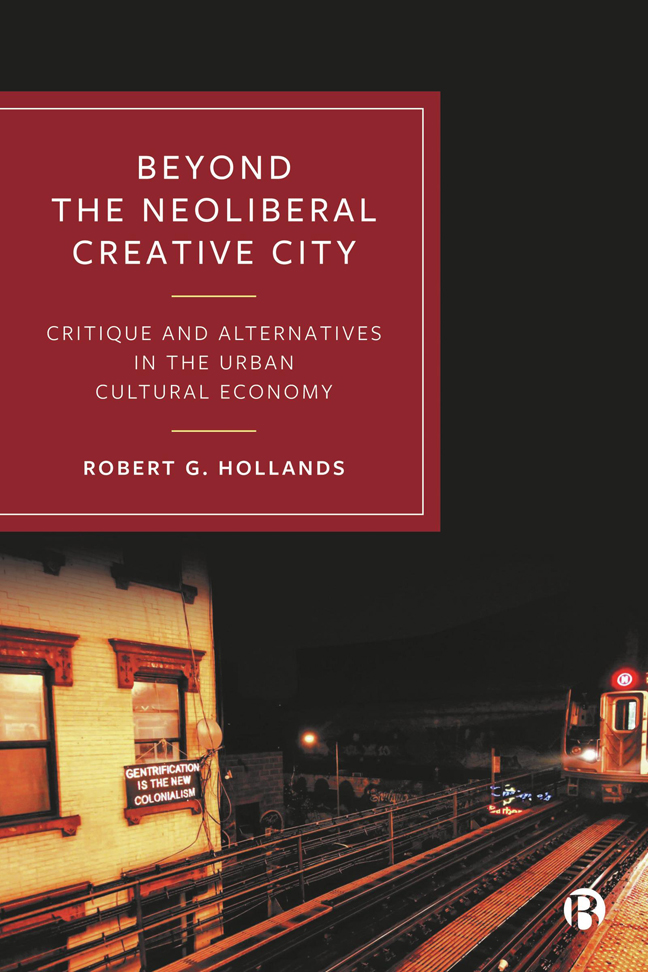Book contents
- Frontmatter
- Dedication
- Contents
- List of Figures, Tables and Case Studies
- About the Author
- Preface
- 1 Neoliberalism, Creativity and Cities
- 2 Urban Entrepreneurialism: The Emergence of the Cultural Economy
- 3 Critiquing the Neoliberal Creative City: But Long Live Alternative Creative Spaces!
- 4 Urban Cultural Movements and Anti-Creative Struggles
- 5 Neoliberal Nightlife and its Alternatives
- 6 Rethinking the Tourist City: Contestation and Alternative Cultural Tourism
- 7 Creative Polarization, Division and Exclusion
- 8 Beyond the Neoliberal Creative City
- Notes
- References
- Index
5 - Neoliberal Nightlife and its Alternatives
Published online by Cambridge University Press: 25 January 2024
- Frontmatter
- Dedication
- Contents
- List of Figures, Tables and Case Studies
- About the Author
- Preface
- 1 Neoliberalism, Creativity and Cities
- 2 Urban Entrepreneurialism: The Emergence of the Cultural Economy
- 3 Critiquing the Neoliberal Creative City: But Long Live Alternative Creative Spaces!
- 4 Urban Cultural Movements and Anti-Creative Struggles
- 5 Neoliberal Nightlife and its Alternatives
- 6 Rethinking the Tourist City: Contestation and Alternative Cultural Tourism
- 7 Creative Polarization, Division and Exclusion
- 8 Beyond the Neoliberal Creative City
- Notes
- References
- Index
Summary
Nightlife, defined here as night spaces that provide for social mixing and socializing such as bars, pubs and nightclubs, has become a crucial aspect of the urban cultural economy (Kolioulis, 2018). Financially it is a billion-dollar industry many times over worldwide. Nightlife is also a marker of ‘successful’ neoliberal urban development, regeneration and creativity (Eldridge and Nofre, 2018: 4–5). Andrew Tuck, host of a radio show called ‘The Urbanist’, has argued that nightclubs and bars are ‘what draws people to cities, they’re what make places feel vibrant’ (Petrovics and Seijas, 2021: 2). Meanwhile, Florida (2002: 8) has said of his creative class that: ‘A vibrant, varied nightlife was viewed by many as another signal that a city “gets it”.’ In the past few decades, it has been noted that the night has moved from the margins to the centre of urban governance and policy making (Straw, 2018: 226). In short, nightlife has become a central element of the ‘neoliberal creative city package’.
This chapter focuses on an analysis of nightlife in the neoliberal city. The development of the ‘24-hour city’ perfectly represents the impulse to maximize urban branding and extend capital accumulation. It also reveals some of the shortcomings of mainstream nightlife spaces characterized by corporate ownership, segregation, control and exclusion (Hollands, 2016b), not to mention raising a host of other regulatory issues (Acuto et al, 2021) and consumption inequalities (Hae, 2012). Similarly, in much the same way that neoliberal urbanization generally has provoked ‘contestation’, the development of mainstream commercial nightlife spaces has also generated resistance in the formation of creative nightlife alternatives (Chatterton and Hollands, 2003) and ‘experimental counter-spaces’ (Berthet-Meylan, 2022). In addition to this, the pub and club sector has been hard hit by the pandemic, calling into question the resilience and future of this part of the urban cultural economy.
This chapter discusses some of the main developments within the subfield of what has been called ‘nightlife studies’ (Eldridge and Nofre, 2018). In doing so, it relates these to some of the key problems of the creative city.
- Type
- Chapter
- Information
- Beyond the Neoliberal Creative CityCritique and Alternatives in the Urban Cultural Economy, pp. 91 - 112Publisher: Bristol University PressPrint publication year: 2023

